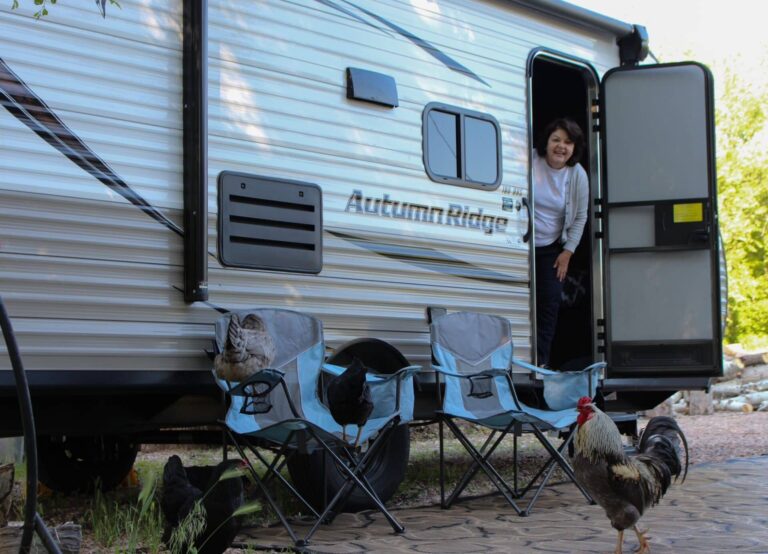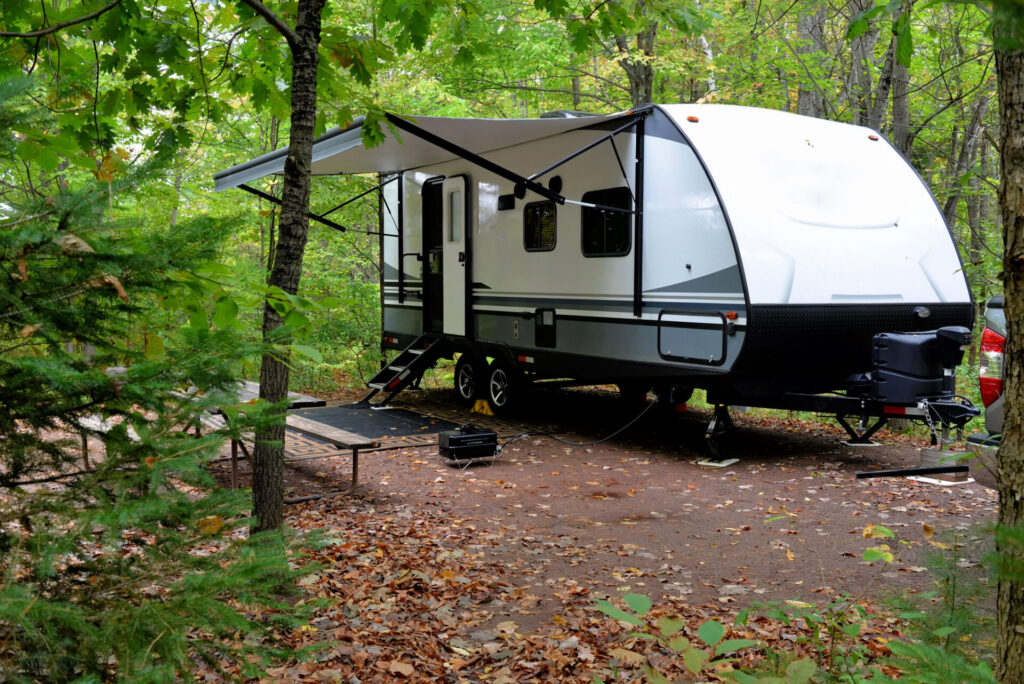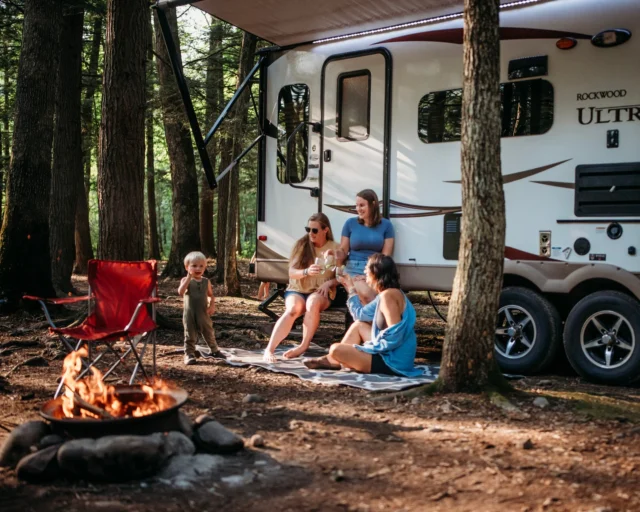
Travel Trailers: What You Need to Know
Travel trailers are defined by their need to be towed by a secondary vehicle, referred to as a tow vehicle. This is distinct from a towed vehicle, or “toad,” which many motorhome owners tow behind their self-powered motorhomes.
The most common travel trailers tend to be between about 18 and 30 feet in length and are generally fairly rectangular in their construction. However, under the large umbrella of travel trailers exists a huge array of types. Teardrop trailers, pop-up campers, fifth wheels, and toy haulers are all types of travel trailers.
One of the biggest advantages of travel trailers is their amount of living space, compared to similarly-sized motorhomes. Even small, compact travel trailers provide more usable space per square foot. They don’t have to devote any of their room to a motor, engine, or driver’s seat! On the other end of the spectrum, RV trailers can be some of the largest, most luxurious vacation vehicles on the market. Some fifth wheels with multiple slide-outs can have more than 500 square feet of living space when in camp mode. That’s bigger than some studio apartments!
Travel Trailer Amenities
Although they don’t have engines of their own, travel trailers can be as luxurious as motorhomes. Since manufacturers don’t have to spend money on an engine, they can outfit travel trailers with high-end appliances and features without sending the final price tag sky-high. These amenities include slide-outs, full-sized kitchens, cozy queen-sized beds, leather couches, and all the other posh extras you’d expect from a high-end rig.
For all of these reasons, travel trailers are an attractive option for campers. If you already have a vehicle capable of towing heavy weights, the investment to purchase your own travel trailer is more affordable. However, if you also need to purchase a tow vehicle, don’t forget to factor in this expense when you’re figuring out your budget. Large RVs often require full-sized, one-ton trucks or very large SUVs to tow.
Smaller Travel Trailers
Of course, there are also small travel trailers like pop-ups and teardrops which can be towed behind smaller vehicles. Many can even be towed by sedans. The important thing to remember is to check your vehicle’s overall tow capacity against the maximum weight, or GVWR, of your travel trailer. Driving an overweight trailer is dangerous, for one thing, and illegal for another. Depending on your policy, it might even void your insurance coverage.
| Category | Travel Trailers |
| Size | 12 – 35 feet |
| Weight | 1,200 – 10,000 lbs |
| Towing Impact on Mileage | Typically reduces the towing vehicle’s MPG by 2 – 5 miles, depending on trailer size and weight |
| Storage | Exterior compartments, interior cabinets, under-bed storage; typically 30 – 120 cubic feet |
| Sleeping Capability | 2 – 10 people |
| Extra Amenities | Kitchen, bathroom (full or half), dinette, entertainment system, slide-outs, solar panels, outdoor awnings |
| Price Range | $10,000 – $100,000+ |
RV Manufacturers Who Make Travel Trailers
Many different RV manufacturers produce travel trailers along with motorhomes. But there are also some travel trailer manufacturers who deal exclusively with towable trailers. Some of the best-known and most-coveted trailers in the industry are made by these kinds of brands, which include Airstream and Casita.
The best way to figure out the trailer that will suit you is to shop around, do as many walkthroughs as possible, and ask lots of questions. Not sure what to ask? Check out our suggestions.
You can also see our full list of the industry’s top RV manufacturers.
Luxury Travel Trailers
Although towable rigs range in cost, some of the highest-rated travel trailers can be pretty expensive. It’s not unheard of to see trailers available for more than $50,000 — and even into the six figures.
Airstream trailers are particularly beloved, both for their iconic looks and historic legacy. Plus, their aluminum construction makes them pretty darn durable. It’s not at all uncommon to see decades-old Airstream trailers on the road, still being used for camping years later.
Of course, what makes for the “best” camper trailer depends on your personal preferences. And although it might be tempting to purchase a super high-end trailer brand-new off the lot, it might not be the best financial move.
Used Travel Trailers
To look for affordable travel trailers near you, both new and used, keep your eye on RV Trader. You can also look at the local classified ads. And since an RV is such a large purchase, don’t be afraid to travel a bit to see a vehicle that looks promising. It’s worth your time and effort to find your dream rig!
Travel Trailer Rentals

The best way to gauge whether or not a travel trailer is right for you is to go camping in one. But when you’re searching the traditional rental market, it can be difficult to find towable rigs. They’re not as easy for new campers to simply start up and go, so lots of large, national dealerships exclusively rent motorcoaches.
But you can often find travel trailers through the peer-to-peer rental market. From sprawling fifth wheels to cute, compact pop-ups, chances are you’ll be able to find just about any vehicle you can imagine available for rent through RVshare.
Travel Trailer Tips
If you’ve never hauled a trailer before, you may be intimidated by the prospect of driving one, even a relatively small one. And there are some significant differences in how to drive when you’re towing several thousand pounds of extra weight.
Although there’s no substitute for practice, you may find these tips helpful as well.
Brake early and often
Your travel trailer adds significant weight to your vehicle, making it much more difficult to stop. Even the best brakes in the world will take longer to stop your motion than they would without that extra weight. Use your brakes well ahead of time, and avoid building up high speeds in the first place. Slamming on the brakes can be disastrous when you’re towing, so taking it slow is a much better option.
You’ll want to be extra cautious in the mountains, when the gravity coming down a slope will affect your rig. This is also why paying attention to your vehicle weight is important. You want to make sure your tow vehicle has the power to stop the weight you’ve got dragging along behind you.
Watch the weather
Learning to drive a travel trailer will take time and practice. It will likely never be as easy as getting into your day-to-day vehicle and hitting the road. If you encounter inclement weather, don’t hesitate to pull off the road and stop the vehicle. It’s way better to get to your destination late and safe than risk injury.
Know your accessories
Travel trailers also have certain parts and accessories that motorhomes do not.
- Leveling blocks and wheel chocks: Some trailers have an automatic leveling system, and you may simply have to hit a button and let the system do its thing. But many trailers do not. You’ll want leveling blocks to set your trailer even, and wheel chocks to provide extra support.
- Electronic brake controllers: Electronic brake controllers are installed in the cab of a tow vehicle and connect to the trailer to help you brake more efficiently. In some cases, they’re even required by law.
Know your trailer weight
You need to know the total weight of your trailer. Also, you should know how much your tow vehicle is capable of hauling. Finally, you need to know how much cargo your trailer can carry.
You’ll see several different stats listed on your travel trailer’s documentation, including GVW (Gross Vehicle Weight), GVWR (Gross Vehicle Weight Rating), GCWR (Gross Combined Weight Rating), and more. You need to ensure that your tow vehicle is capable of pulling not just the “dry” or “curb” weight of your rig, but the entire weight. This includes all the appliances and stuff you bring along. That’s known as a vehicle’s max tow capacity, and it should match up with or outweigh the trailer’s GVWR.
You’ll also need to be sure you don’t overload your trailer with stuff. That will force the weight higher than the rated maximum. You can use truck scales to be sure you’re making weight. You might also want to avoid traveling with full water tanks on board. Water is shockingly heavy — about eight pounds a gallon! You’ll save weight and increase your fuel efficiency if you fill up at your destination.
Know your hitches
There are many different types and styles of tow hitches, and each has its drawbacks and benefits. You want to be sure you have the right one for your trailer’s overall weight and size, so the load is evenly distributed and safely towable. Click here to learn more about travel trailer tow hitches.
Maintain your trailer
You’ll want to do some preventative maintenance on you travel trailer. This will keep it in good working condition for road trips and campouts. Fortunately, your trailer won’t need the work that a motorhome with an engine does.
Make sure you regularly rotate your tires, and check the interior and exterior of the trailer for leaks, water damage, or wear and tear. Test your onboard generator, if you have one, to make sure it’s in good working condition. Check any plumbing systems in your trailer to make sure they work properly. Look over things like your couch, appliances, and other items to make sure they’re in good condition. Finally, clean your trailer after each use, including all appliances.
Properly caring for your travel trailer ensures that it will be ready for many years of camping and adventure!






